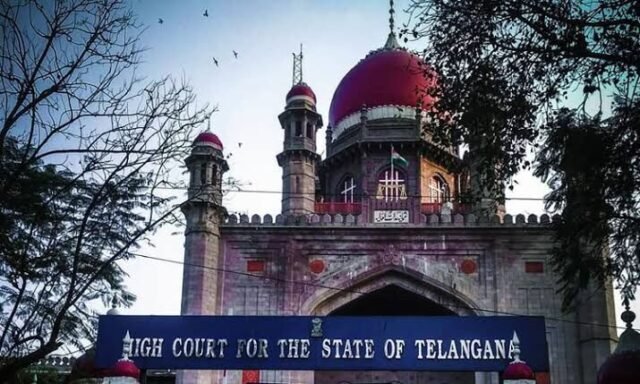Hyderabad: Allegations of large-scale encroachment of 27.18 acres of prime government land worth nearly Rs 10,000 crore in Khajaguda, under Serilingampally mandal, have reached the Telangana High Court.
Four Congress MLAs—Yennam Srinivas Reddy (Mahabubnagar), Rajesh Reddy (Nagarkurnool), Anirudh Reddy (Jadcherla) and Muralinayak (Mahabubabad)—filed a Public Interest Litigation (PIL), accusing private players of illegally occupying government land and carrying out massive constructions in violation of environmental and urban planning norms.
8 skyscrapers each with 47 floors
Presently, eight skyscrapers, each with 47 floors, are being constructed on the disputed site, which lies within the Full Tank Level (FTL) of Khajaguda Lake, a sensitive ecological zone.
During the hearing on Monday, senior advocate Chikkudu Prabhakar, representing the petitioners, told the court that 27.18 acres of land falling under Survey Numbers 119 and 122 in Khajaguda had been encroached upon.
He further alleged manipulation of survey numbers and unauthorised occupation of empty land, which is classified as non-transferable public property.
Air pollution near school
The advocate pointed out that the Ranga Reddy district administration issued a No Objection Certificate (NOC) in 2023, based on which the Greater Hyderabad Municipal Corporation (GHMC) approved high-rise construction plans.
Raising additional concerns, Prabhakar highlighted the operation of a ready-mix concrete plant within 150 meters of a private school in the vicinity, causing severe air pollution and posing health hazards to students.
Court seeks government response
Taking serious note of the allegations, the Telangana High Court issued notices to the State government, the chief secretary of Revenue, Ranga Reddy district collector, GHMC, HMDA and HYDRAA. The court directed them to respond and adjourned further hearing by two weeks.
The PIL has brought renewed attention to real estate developments in Hyderabad’s rapidly urbanising outskirts and the alleged nexus enabling land misuse, raising questions about accountability and enforcement in urban planning.







